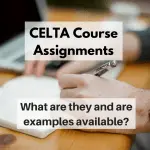The Lessons from the Classroom CELTA assignment is slightly more accessible than other assignments on the course, but it still deserves your full attention to complete it to a high level.
It is also an extremely beneficial experience as it engages you in a form of reflective practice. This is not only helpful for your development as a teacher, but reflecting in this way can also help you in other professional and personal domains.
This assignment is also a great opportunity to show that you have been continuously learning and applying what your tutors have told you throughout your CELTA course.
I should also add that for some
Either way, this post follows the rubric and guidance from the Cambridge CELTA syllabus, as found on their official site. In short, it will all be relevant
So, to give you a brief outline, throughout this post I will go through the following:
- Logistics and rubric of this assignment
- Points to include in your work
- Tips to get through it
- Books to help you with this CELTA assignment
- Useful links and relevant resources
- Examples of various Lessons from the Classroom assignments posted online
Ready? Let’s go!
What is the word limit for the ‘Lessons From the Classroom’ CELTA assignment?
As stated in the Cambridge CELTA syllabus, the word limit for the Lessons From the Classroom assignment is 750 to 1000 words
As with all of these assignments, make sure you are within this range! It would be silly to risk losing marks because you are a few words over or under the limits given.
What do you have to include in this assignment?
In this written assignment on your CELTA course, you will have to show the following:
- That you can identify and are aware of your strengths in teaching.
- That you know what you need to do to develop as a teacher and can and suggest practical ways to do this.
- That you can reflect on your teaching, as should be evident from the points above.
- What you have learnt by reflecting on your observations of experienced ELT professionals, probably your tutors or other teachers.
How can you evidence or demonstrate the points above in the Lessons from the Classroom CELTA Assignment?
In terms of answering points 1-4 above, you can do the following:
- Include a clear section on the strengths
in your teaching, with specific examples. For example, state when and how you identified these strengths, and follow this with an equivalent section detailing some of your weaknesses. - Identify specific aspects of ELT knowledge and skills which you feel need to learn the most about.
- As continued from above, if you are particularly unsure about teaching pronunciation, for example, you could identify in your assignment specific resources or workshops to attend to help you improve this aspect of your teaching.
- This point is also about being specific. To do this, try the following:
- Mention lessons and language points that you have observed ELT professionals teaching. Go into detail about surprising or noteworthy points from the lessons you observed and how it changed your perspective
.You could also mention parts of lessons that you observed which reaffirmed or validated your own teaching practice, perhaps through things that you have already done in your TP sessions.
- Mention lessons and language points that you have observed ELT professionals teaching. Go into detail about surprising or noteworthy points from the lessons you observed and how it changed your perspective
Tips for the Lessons from the Classroom CELTA Assignment
With the above points in mind, below are some key tips to help you complete this task to the best standard that you can.
Keep a Diary
Keep a diary throughout the course to help you reflect on all that you have learnt and the journey that you have been on.
You will have the CELTA 5 booklet that
If you complete a few words in here at least 3-4 days a week (it doesn’t have to be any more than this), then this assignment should more or less write itself
If you do not like writing in this way, you could equally keep a video or audio record on your smartphone or
You could even post to Instagram with a hashtag like #celtadiary (although there’s not much there yet!) and take a selfie each day. It doesn’t have to be a chore!
The problem is that if you do not do something like
Without a diary or journal, you may struggle to remember these things, not least because you feel so tired with all that you have learnt throughout the CELTA course!
Be Specific
When you are specific in your observations and writing, you make it much easier for yourself and for your tutors to understand exactly what you are trying to say.
You will also have many moments and experiences to reflect on. So, if you can, state the exact language point at a certain part of a lesson during a specific teaching practice session. For example:
“Near the start of TP3, I was eliciting information from the pre-intermediate students’ to confirm their prior knowledge of the past perfect. From their answers, I realised I had assumed that they would know more about this language point than they did, which caused problems for the rest of my lesson. This made me realise that making such assumptions could be problematic for future lessons, and therefore I decided to pitch subsequent lessons at a slightly lower level for that group.”
Using Clear, Accurate and Appropriate Language
If you’re concerned about your ability to write clearly, accurately and appropriately for this assignment, as is a key part of the rubric for this, below are a few things you can do.
The first thing I would recommend for anyone, native or non-native speaker, is to print out the assignment on paper and go over it by hand.
I know timing can be an issue which makes you think this is not possible, but even if you do it quite quickly by hand, I’m sure you will identify more issues than by spending the same amount of time checking it on a screen.
When checking on paper, treat this as if you were marking a student’s written work, take a red pen and add any corrections as needed.
I do this all the time for most of my blog posts (including this one), and for any formal written work I need to submit. Although the odd error still does slip through the net (!), I find many more errors than I do by looking at them on the screen.

I also quickly become aware of awkward language of sentences through doing this, again something which I don’t always sense when I am looking at it on a screen.
Another thing you can do here is to swap your work with someone else on the course whom you trust. Obviously, this is a judgement call on your part but if there is someone who you feel you can trust in this way, then just ask and see what they say.
Even if the person reading it is not a CELTA tutor, they should still be able to identify awkward parts of language or points which are unclear more readily than you, the writer.
Useful Links & Relevant Resources for this CELTA Assignment
For further recommended reading and resources, below are some useful links for you:
- This guide to the assignment by ELT Concourse has lots of detailed questions to think about and consider and is well worth a read.
- This video by Jo Gakonga of ELT Training is very detailed and helpful.
Books for the Lessons from the Classroom Assignment
In terms of books, you will certainly benefit from reading around the topic. Here are the most useful books to check out:
- The Practice of English Language Teaching by Jeremy Harmer
- This book can help you to consider relevant areas for teacher development in your future in the ELT profession.
- Learning Teaching by Jim Scrivener
- An extremely popular book which will serve you well before, during and after the CELTA course.I like Scrivener’s practical approach to writing and teaching and it will likely suit you if you prefer practicality over theoretical or technical aspects of teaching. His books always seem to be very ‘readable’, likely for the reason above.
- Grammar for English Language Teachers by Martin Parrott
- This is a fantastic guide to improve your knowledge of and ability in teaching grammar.It has many relevant practical exercises which could serve as examples in your assignment, too.
- Sound Foundations by Adrian Underhill
- This book helps to make teaching pronunciation clearer and more fun.Underhill is all about pronunciation as a physical activity and will likely make you think of speech in a different way as a result.
- NB: All of the above are affiliate links, as with links to the diary and journal. This means no difference in price for you but, if you choose to purchase through these links, it helps to support CELTA Helper to continue to publish content and help people like you on their CELTA journey.
Example ‘Lessons from the Classroom’ Assignments with PDFs
Here are some examples
I should also add that these are examples which students have uploaded. It does not mean that they are exemplary, rather that they can give you an idea of the finished work.
- CELTA Assignment 4: Lessons from the Classroom by Iuliia Kumicheva on Academia.edu
- CELTA Assignment 4-Lessons from the Classroom by Jai Kumar on Academia.edu
- CELTA Assignment Three: Lessons from the Classroom by Joss Wright on Cite SeerX (which certainly looks like a trustworthy website from first glance)
- CELTA Lessons From the Classroom by tranzit on Scribd.com
Summary
To round up, you should now be able to see that the lessons from the classroom CELTA assignment
Following the steps outlined above should help you to meet the key requirements of this assignment on your C
If you also have this assignment in mind throughout your course, then you should have little trouble in writing it since you will be thinking in this way from the start. On the CELTA, self-reflection will help you, just as it will in your future work.
If you have any questions about this assignment that
Best of luck with your assignment and the rest of your course!
Steve
PS You may also like to get your assignments or application checked by Scribendi – an online proofreading service (affiliate link) I used to work for that provides high-quality work.





